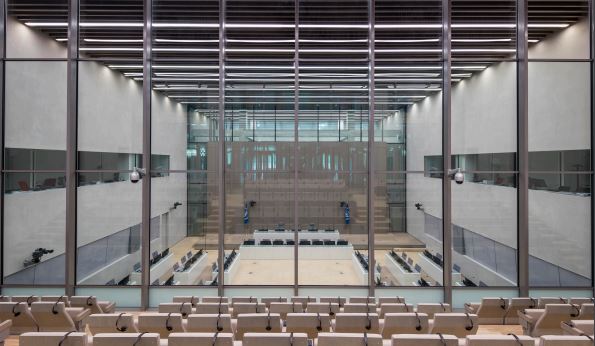New IBA report reviews mechanisms to prevent and remedy injustice before international criminal courts and tribunals
Thursday 8 December 2022

Download report
The International Bar Association (IBA) International Criminal Court and International Criminal Law (ICC & ICL) Programme has published a new report examining the legal frameworks and practices of international criminal courts and tribunals to remedy international injustice through appeals, retrials, reviews or revisions of judgments and compensation for miscarriages of justice. Remedying international injustice: appeals, retrials and revisions of judgments in international criminal law is the latest report from the IBA ICC & ICL Programme and forms part of the IBA’s longstanding contributions towards a just and effective system of international justice.
IBA President, Sternford Moyo, said: ‘International criminal courts and tribunals are tasked with the vital role of holding to account individuals responsible for genocide, crimes against humanity, war crimes and aggression. However, criminal justice is not an exact science. It is therefore essential that effective safeguards are put in place to correct wrongful convictions and, in appropriate circumstances, wrongful acquittals if they occur.’
IBA Executive Director, Dr Mark Ellis, commented: ‘There are many factors, within and beyond the control of international criminal tribunals, that may lead to wrongful convictions and unfair trials. This report recognises such risks and seeks to assist the ICC and other international criminal tribunals in avoiding the devastating impact of injustice on wrongfully convicted persons and on the public's confidence in international justice.’
Across four chapters, the report considers four procedural mechanisms aimed at preventing and remedying injustice: appeals, retrials, revisions, and compensation for miscarriage of justice. It examines how each remedy has evolved and been applied by international criminal courts and tribunals to date, including the International Criminal Tribunal for the former Yugoslavia (ICTY), the International Criminal Tribunal for Rwanda (ICTR), the International Residual Mechanism for Criminal Tribunals (IRMCT), the Special Tribunal for Lebanon (STL) and the permanent International Criminal Court (ICC). Drawing from this analysis, the IBA makes detailed recommendations to the ICC to maximise its safeguards, recognising that they may also be relevant for other active and future courts and tribunals. Below is a summary of each chapter.
Chapter 1 - Appeals
Appeals – the vital first line of response to prevent injustice – are available before all contemporary international criminal courts and tribunals. This is consistent with international human rights law which requires that a convicted person must be able to seek a review by a higher tribunal. They also provide that the prosecution can appeal acquittals. The IBA report examines more than 25 years of appeals practice and jurisprudence. Although it finds that most of the procedures and standards applied are robust and fair, it highlights some issues that the ICC should seek to address. This includes establishing effective mechanisms so that the Appeals Chamber can remand issues to the original trial chamber, if necessary; ensuring that an acquitted person can be released pending a prosecution appeal; and developing conditions and criteria governing the Appeals Chamber’s discretion to order the remedy of a retrial, reflecting that it is an extraordinary measure.
Chapter 2 – Retrials
When a retrial is exceptionally ordered, it is essential that the new trial is fair. It should not be conducted as though there had never been a first trial, which could cause prejudice to the accused. It is particularly important that the prosecution is not given a second chance to correct errors that it made in the first trial or to benefit unduly from having heard defences previously presented. The report examines the three international retrials that have been conducted so far by the ICTY, ICTR and the IRMCT, highlighting fairness challenges that arose in each. It recommends that the ICC considers a range of measures to safeguard the rights of the accused in the possible event that it orders a retrial in the future, including developing criteria for defining the scope of the retrial; developing rules limiting the admission of new evidence by the prosecution; and ensuring victim participation and outreach to affected communities during the retrial.
Chapter 3 – Review/revision of judgments
Review and revision processes available before all recent international criminal courts and tribunals provide the possibility that a judgment can be reviewed even following the appeal process, if new information is discovered that indicates an injustice occurred. The report examines reviews conducted by the ICTY, ICTR and IRMCT and contrasts their processes with the ICC’s revision process, which has yet to be implemented. It makes a series of recommendations for the ICC to ensure that future applications for revision of alleged wrongful convictions are fully considered and fairly determined.
Chapter 4 – Compensation for miscarriage of justice
Finally, the report considers ground-breaking provisions in the ICC Statute providing for compensation in the event of a miscarriage of justice. It examines the ICC’s consideration of three applications for compensation to date and recommends measures to ensure that future compensation awards are determined coherently and consistently.
Read the full report here.
ENDS